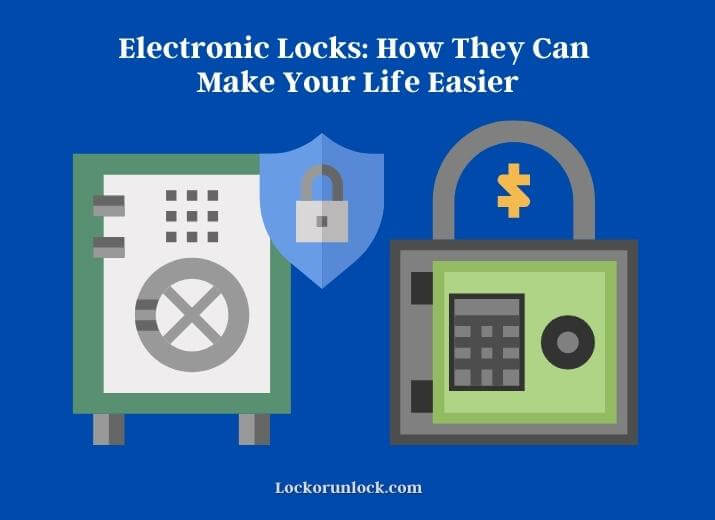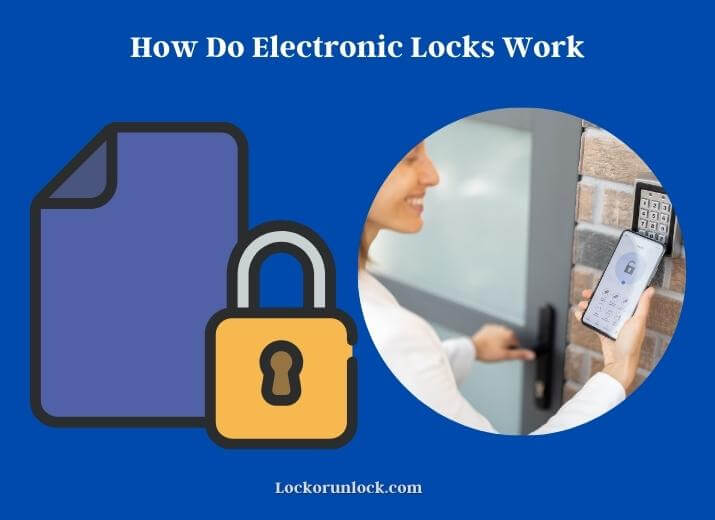The world of home security has seen significant advancements in recent years, with the development of electronic locks being one of the most notable. As technology continues to evolve, homeowners and businesses are looking for more innovative and effective ways to protect their property, and electronic locks provide just that.

These locks use electronic components to control access, eliminating the need for physical keys and offering increased security, convenience, and ease of use. With their many benefits, it’s no wonder that electronic locks are becoming an increasingly popular choice for those looking to upgrade their home security.
What Are Electronic Locks?
Electronic locks are a modern type of locking mechanism that has gained popularity in recent years. Unlike traditional mechanical locks, which require a physical key to unlock, electronic locks use a variety of electronic components to control access. These components can include a keypad, biometric scanner, or smart technology.
Keypad locks are one of the most common types of electronic locks. They require the user to enter a code on a keypad to unlock the door. Biometric locks use fingerprint or facial recognition technology to grant access, and smart locks are connected to a home automation system and can be controlled remotely via a smartphone or other device.
Electronic locks offer several benefits over traditional locks. For one, they are more secure than traditional locks, as they are not susceptible to picking or bumping. They also eliminate the need for physical keys, which can be lost or stolen, and they are easy to use, requiring no physical effort to unlock.
Electronic locks can be customized to grant access to specific individuals at specific times. For example, a keypad lock could be programmed to grant access to a housekeeper only on certain days and at certain times. This customization feature provides added security and control for homeowners and businesses.
Types of Electronic Locks
There are several types of electronic locks available on the market, each with its own unique features and benefits.
Keypad Locks
Keypad locks are one of the simplest types of electronic locks available. They require the user to enter a numeric code on a keypad to unlock the door. These locks are easy to use, and the codes can be changed easily to provide enhanced security.
Biometric Locks
Biometric locks use fingerprint or facial recognition technology to grant access. These locks are highly secure, as they rely on unique physical characteristics to identify authorized users. Biometric locks are commonly used in high-security areas, such as government buildings or research facilities.
Smart Locks
Smart locks are connected to a home automation system, allowing users to control the lock remotely via a smartphone or other device. This type of lock offers convenience, as users can lock or unlock the door from anywhere, as well as customization features such as temporary access codes.
Magnetic Locks
Magnetic locks use an electromagnet to hold the door closed. When power is supplied to the magnet, the door is unlocked. These locks are commonly used in commercial buildings, as they are highly secure and can be easily integrated with other access control systems.
Electromechanical Locks
Electromechanical locks use a combination of electronic and mechanical components to control access. They can be unlocked using a numeric code, card reader, or other access control system.
How Do Electronic Locks Work?
Electronic locks work by using a variety of electronic components to control access.

Input
The user provides input to the lock, typically in the form of a code, keycard, or biometric data (such as a fingerprint).
Processing
The lock’s electronic components process the input, comparing it to stored data to determine whether access should be granted.
Power
Electronic locks require a power source, which can come from batteries, a wired connection, or a combination of both.
Release
If the lock determines that the input is authorized, it releases the lock mechanism, allowing the door to be opened.
Smart locks, on the other hand, can be controlled remotely through a mobile app, and some models can even use Bluetooth or Wi-Fi to automatically unlock when the user is in proximity to the lock.
Common Misconceptions About Electronic Locks
Despite their many benefits, there are still some misconceptions surrounding electronic locks. Here are some common misconceptions about electronic locks and the truth behind them:
Electronic Locks Are Not Secure
Many people believe that electronic locks are less secure than traditional locks because they are vulnerable to hacking or electronic interference. Electronic locks are designed with multiple layers of security to prevent hacking and other forms of electronic tampering. Electronic locks are not susceptible to picking or bumping, which are common methods used to bypass traditional locks.
Electronic Locks Are Complicated to Use
Some people assume that electronic locks are difficult to use or require technical expertise. However, electronic locks are often more user-friendly than traditional locks, as they eliminate the need for physical keys and can be customized to fit the needs of the user. For example, a homeowner can program a keypad lock to unlock at certain times of the day or for certain individuals only.
Electronic Locks Are Expensive
While some electronic locks can be more expensive than traditional locks, there are many affordable options available. In fact, some basic keypad locks can be purchased for a similar price to a traditional lock and key.
Electronic Locks Require Constant Maintenance
Another common misconception is that electronic locks require a lot of maintenance and repair. Electronic locks are often more durable and require less maintenance than traditional locks. Most electronic locks have a backup power source in case of a power outage, ensuring continued functionality.
Benefits of Electronic Locks
Electronic locks offer a range of benefits over traditional locks. Here are some of the main benefits of electronic locks:
Enhanced Security
Electronic locks offer higher security than traditional locks. They eliminate the risk of unauthorized key duplication and are resistant to picking and bumping. Electronic locks often have multiple layers of security features, such as biometric scanning or remote access control, that provide enhanced protection against intruders.
Convenience
Electronic locks offer greater convenience than traditional locks. Users do not need to carry physical keys, which can be lost or stolen. Instead, they can use access codes, biometric data, or other means of access to unlock the door. Some electronic locks can also be controlled remotely through a mobile app, allowing users to lock or unlock the door from anywhere.
Customization
Electronic locks offer a high degree of customization. Homeowners and business owners can program access codes for specific individuals or set up temporary access codes for visitors. Some electronic locks can also be programmed to unlock at certain times of the day or to require multiple forms of authentication for enhanced security.
Durability
Electronic locks are often more durable than traditional locks. They are resistant to wear and tear and can withstand harsh weather conditions. Many electronic locks have a backup power source in case of a power outage, ensuring continued functionality.
Integration With Other Security Systems
Electronic locks can be easily integrated with other security systems, such as video surveillance or alarm systems. This allows for a comprehensive security solution that can be monitored and controlled from a central location.
Editors Choice
Electronic locks are a modern and effective way to enhance home and business security. They offer a range of benefits, including enhanced security, convenience, customization, durability, and integration with other security systems.
Although there are some misconceptions surrounding electronic locks, they are designed with multiple layers of security to prevent hacking or electronic interference. Electronic locks are user-friendly and easy to customize to fit the needs of the user.
They also offer greater durability and require less maintenance than traditional locks. Electronic locks offer a reliable and secure way to protect your property and ensure peace of mind.
